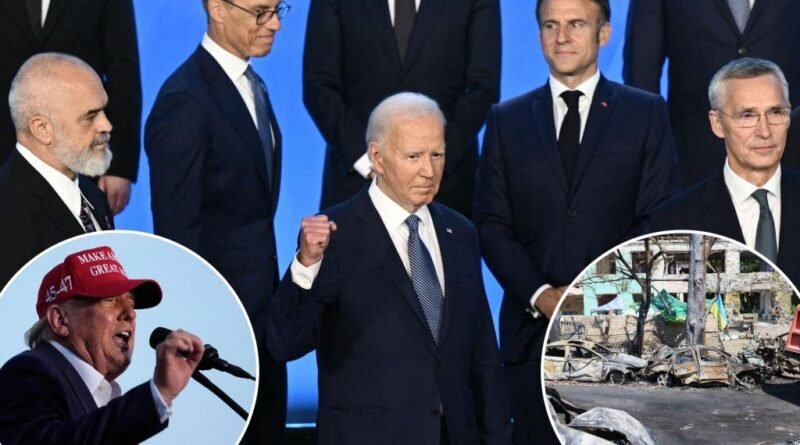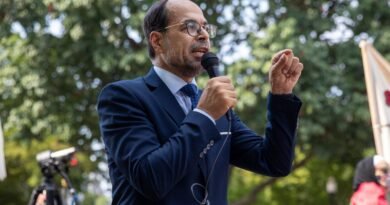Trump watches NATO’s every move

This week, the North Atlantic Treaty Organization descended on Washington to celebrate NATO’s 75th anniversary. The member states convened for the most anticipated meeting of the post-Cold War era. At the opening gala on Tuesday night, President Biden greeted foreign dignitaries in the room where the original treaty was signed in 1949. The prevailing theme was unambiguous. The alliance would project unity, resolve, and a common sense of purpose.
However, cracks in that façade are impossible to ignore. The war in Ukraine — which served as a strategic adhesive at its outset and prompted alliance expansion to the High North countries of Finland and Sweden—now grinds on members states. It has tested their strategic and energy reserves, defense industrial capacity, and political willpower. Meanwhile, domestic developments in the United States have left European delegates tugging at the collars at the thought of a second Trump administration.
Amid these anxieties, NATO’s European representatives will likely extend lavish promises to keep the United States placated and sufficiently invested in the status quo.
They will do so by offering greater burden-sharing in fulfillment of the “Wales Pledge.” In 2014, NATO member states gathered in Cardiff to formally commit to spending 2% of GDP on defense and 20% of those monies on new military hardware. It is notable that this very modest commitment took a decade to accomplish. Well, nearly. As outgoing Secretary-General Jens Stoltenberg acknowledged earlier this year, NATO allies will only reach the 2% target as a cumulative average, with 10 member states failing to meet or exceed the objective in 2024.
One wonders what sort of external shock would be required to prompt full adoption of the pledge after two and a half years of war on the alliance’s eastern flank? Moreover, given the possibility of US retrenchment, that 2% spend may prove suddenly insufficient.
In addition to spending more, the European delegates have promised to expand the map of alliance activities. This approach is not without precedent. NATO adopted an expeditionary mission after the collapse of the Soviet Union more than three decades ago, and went “out of area” for the Balkan Wars and US-led interventions in Afghanistan and Libya years later.
But now our European allies are promising to help counter China’s aggressive behavior in the South China Sea. This would likely include freedom-of-navigation operations conducted by alliance members. Of course, most NATO states would be unable to contribute to a Pacific mission. Few command “blue water” navies capable of projecting global power. Many are geographically landlocked. Others may simply feel compelled to concentrate defense capabilities closer to home.
Finally, NATO-Europe members will work with the Biden administration to “Trump-proof” the alliance’s presence in and assistance to Ukraine. This will include the permanent deployment of a senior civilian NATO official to Kyiv. The alliance also announced new efforts to train and arm the Ukrainian military but stopped short of guarantees or timelines for granting membership within the security collective.
Understandably, some NATO states are wary of absorbing “Article V” collective defense obligations —ostensibly compelling the alliance to go to war on behalf of Ukraine — for a country that’s currently locked in bitter combat with a nuclear superpower. This has not foreclosed further talk and empty promises about an “irreversible” path to membership.
Policymakers in Washington should judge these pronouncements warily. Rather than expanding its responsibilities and the alliance map, our European counterparts should be encouraged to retool their NATO contribution to accomplish its founding purpose: namely, the resolute defense of the North Atlantic.
For instance, pledges to meet the 2% threshold for defense spending are welcome — if inadequate — but often rely on creative accounting rather than acquisition of actual military capability. Europe should take steps to fortify its strategic autonomy: improving military coordination among member states, investing in a cross-border defense industrial base, and manning the ramparts at the eastern front.
American military power can thus be redeployed from a forward presence in Europe to meet the challenges posed by China. The US would not abandon its alliance commitments — our naval assets, airpower, and nuclear arsenal would provide a formidable backstop — but this would shift the primary burden to our wealthy and capable allies. This would also negate calls for European frigates to patrol the Indo-Pacific.
Meanwhile, empty promises about Ukrainian membership in NATO demonstrate the triumph of ideological commitments over alliance interests. Washington has already said it is unwilling to risk World War Three over the line of demarcation in the Donbas. Protestations to the contrary will achieve little deterrent effect. Similarly, the permanent NATO mission to Kyiv proposed at the Washington summit may have the paradoxical effect of prolonging the war by inflating false hopes in Ukraine while further provoking the roots of Russian predation.
Instead, as NATO celebrates 75 years, the best gift it can give itself is to get back to basics by meeting commitments, enhancing capabilities, and focusing on its fundamental purpose of continental defense. Ultimately, an alliance that is committed to the stout protection of Europe will be more appealing to any US leader than one premised on false promises and anxious pleading.
Reid Smith is vice president of foreign policy at Stand Together.




